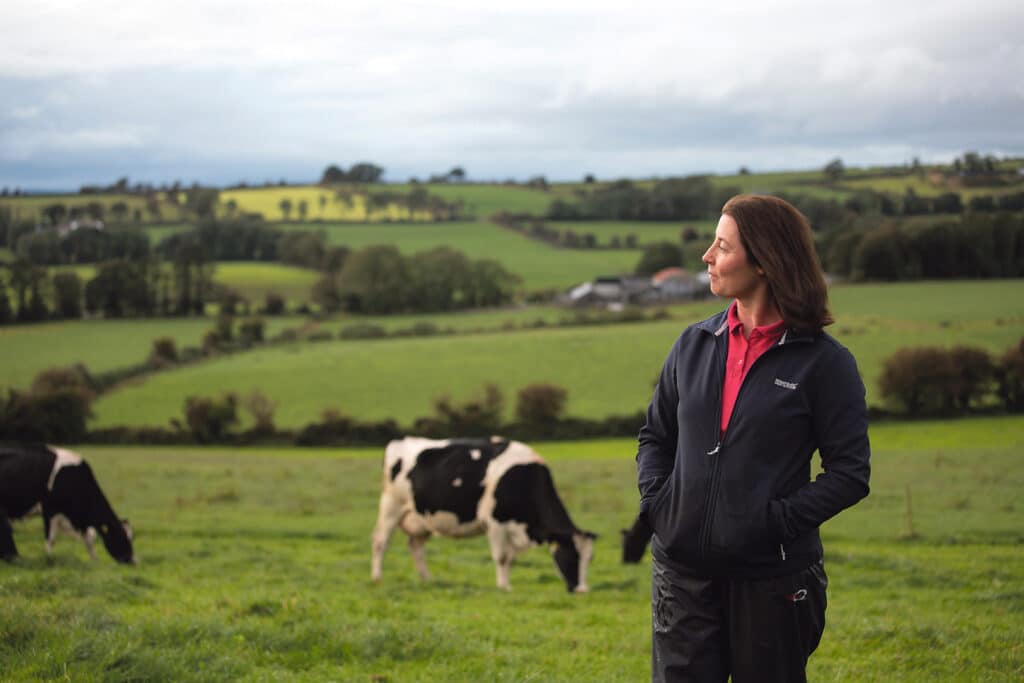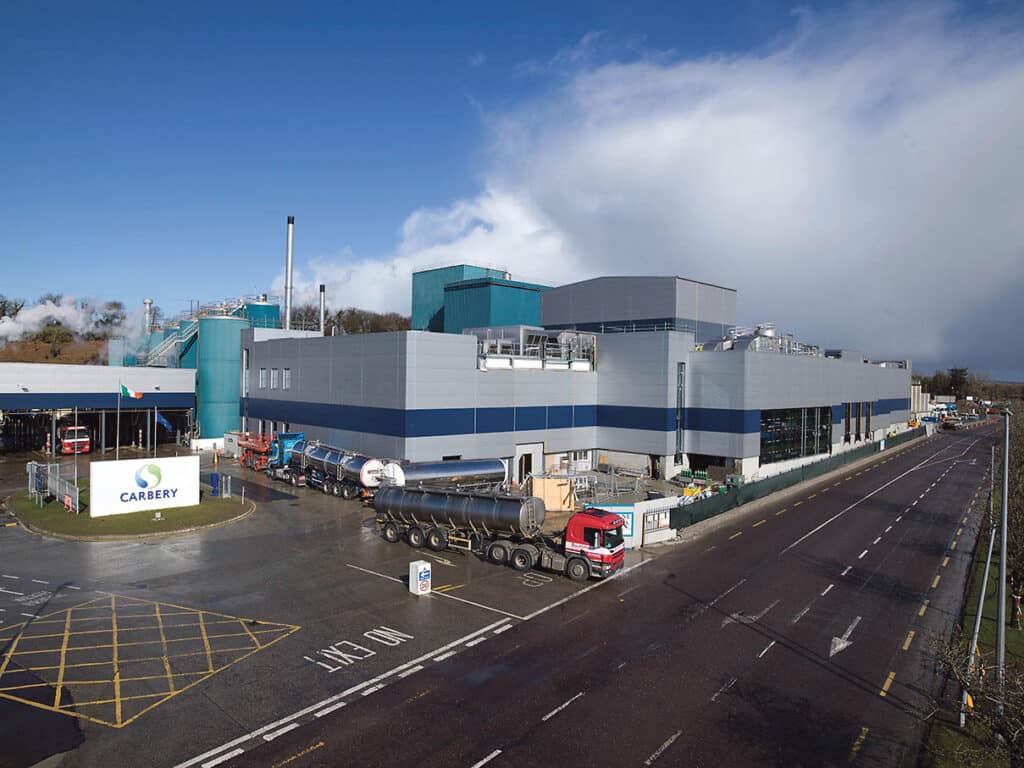West Cork farmer Vanessa Kiely O’Connor has always had a passion for nature and wildlife and loves the flexibility that farming allows with family life. “I feel grounded working outdoors,” she explains simply “and I love working with cows.”

The mother-of-two, who has built a best in class dairy farm in Upton, recently shared her story as part of Kerrygold’s new global digital campaign highlighting the important role that Irish farmers play in producing a premium product that is recognised globally.
With farming classed as an essential service being a food production industry, it was not as impacted by the Covid-19 restrictions as other sectors. “Farmers have always had to adapt to different farm practices to adhere to the rules and regulations surrounding quality food production, ” explains Vanessa. “Covid-19 only added small adjustments to on-farm biosecurity procedures.”
“I do really miss being able to shake hands or hug a friend though,” she says. “It was also really difficult not being able to see my Dad, who lives in Limerick.”
Having all the family at home 24/7 during lockdown did, Vanessa admits, take some time to get used to, as she is so used to working on her own. Although for the first time ever, it meant there were plenty of hands available to help out on the farm. “Available but not always willing,” she says laughing.
This is the time of year when Vanessa gets stuck into farm maintenance jobs around the farm, catching up on all the jobs that need doing after a busy spring.
At the moment, with the help of her daughter Sadhbh, she is busy cleaning out straw beds and power hosing cubicles after the winter.
Vanessa’s husband David (who has been on reduced hours from his job at Cork airport) and their son Fintan are working on a cow shed extension project, which the family started last year. “Normally David would have only two days off a week (from his full time job) to devote to the project, so there has been more progress than would have been expected,” explains Vanessa.
Milking starts at 7am and work on the farm finishes at 6.30pm so Vanessa’s day consists mostly of farm work, fitting in housework, meals and family time around this. She likes to take time to herself by gardening or taking a leisurely stroll around the farm with the dogs.
Routine jobs like weekly grass measuring, harvesting the silage, continuous management of calves, maiden heifers and cow’s health all take place throughout the summer, along with farm discussion group meetings – now online through Zoom. “The meetings are at the mercy of our broadband connection,” says Vanessa.
For milk recording, which starts in March, she had to learn to use milk metres to take samples. “Normally I would have had a milk recording person come and do the sampling on the farm,” she explains.
Vanessa’s farm improvements have always been focused and committed to farming sustainably both environmentally and economically to produce the highest quality milk she can.
As the farm is a food producing facility and is Bord Bia audited and quality assured, bio-security measures have always been in place as a standard procedure. “It meant that during lockdown no visitors were allowed on the farm,” explains Vanessa, “except for the milk collection lorry and farm supplies-related deliveries.”
“I think that everyone involved with the dairy industry in West Cork should be so proud of how we have all worked together to ensure that the farming sector functioned as normal and all the milk in West Cork was processed in what is our peak milking season,” says Vanessa proudly. “A shutdown would not only have been devastating for farm families but would have had a huge economic impact on all the towns, villages and communities throughout West Cork.
It is worth noting that for every €1 a dairy farmer makes, on average 90 cent of that is spent locally in shops, businesses and farm services.
“In recent years people appear to have become disconnected from the food that they eat and all the latest fad type foods seem to be all about alternatives to natural foods; it makes no sense to me whatsoever,” says Vanessa. ‘Saying that, I think that Covid has woken many people to the connection between nutritious local produce and the quality of Irish Agricultural foods produced sustainably here. I also think it’s great that people had the time to cook, bake and sit down and enjoy wholesome, unrushed meals with their families during lockdown.”
Latest research produced by the European Milk Forum shows that almost 40 per cent of Irish consumers under the age of 35 increased their consumption of dairy produce during lockdown.
One of the main challenges that Vanessa and other dairy farmers face is the rising costs of milk production. “Having to constantly reinvest income back into the farm to try and keep up with the ever changing EU and Irish production requirements ,rules and regulations of the day can cause financial stress,” explains Vanessa. “I do worry that the increasing costs of production will affect the viability of family farms”.
She feels very passionately that Irish farmers have received too much criticism and instead need to be recognised for the quality of the produce and efforts they put into farming sustainably.
“Last year I travelled to Germany and Austria and toured their dairy and beef farms. The animals on all the farms I visited are kept indoors, the feed is grown and brought into them using highly mechanised feeding systems to reduce labour. Their animals are well looked after but they never get outside. I didn’t see a bird, a bee or a rabbit, no ditches or hedgerows like you’d see here, just vast fields of maize and grains, which are tilled and harvested annually to feed the animals or to feed bio digesters.
“It’s easy to get overwhelmed by all the calculations and scientific reports in terms of the environment, climate action and dairy markets,” she says.
“What worries me is that these environmental reports on EU farming emissions are being calculated based on those farming systems on the continent. You don’t need to be a scientist to know that there is a very different environmental impact between Irish farms and the farming practices on the European continent and I feel our hedgerows and our grass based farm system is not currently getting recognised with the environmental credit it deserves. Ireland’s grass based system is one of the most sustainable methods of agriculture in the world and one that our whole country should be proud of.”
West Cork farmers are renowned for their progressive sustainable farming practices and Vanessa believes that the passion and pride that all West Cork farmers take in their grass-based system is part of the reason.
“West Cork is the ‘Dairy Capital of Ireland’ she says smiling. “We have the best land for growing grass, along with weather that blesses us with just the right amount of rain and sun to grow our high protein quality grass, which feeds our healthy outdoor grazing cows. Add to this passionate, progressive, proud, hardworking family farms, co-ops, and a processor such as Carbery, supported by our community, and you have a recipe for the most sustainable, highest quality grass fed dairy produce in the world. This is why the West Cork Dairy Story is truly unique and renowned nationally and globally!



